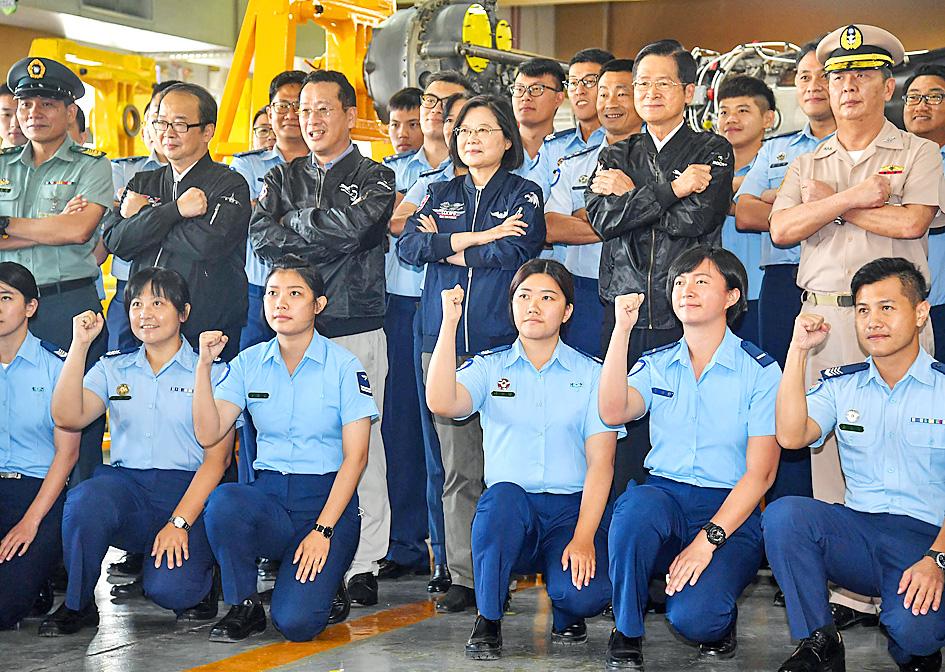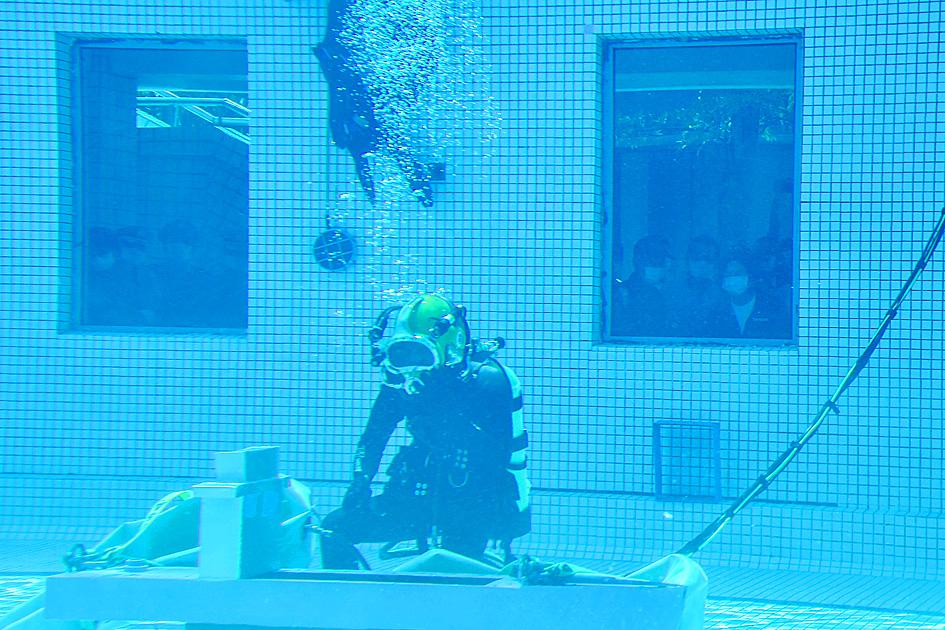President Tsai Ing-wen (蔡英文) yesterday toured several military bases in Kaohsiung to thank military personnel for their contributions to safeguarding the country in the face of repeated incursions by the Chinese air force.
Tsai visited the air force’s 3rd Logistics Command in the city’s Gangshan District (岡山), the army’s Engineer Group in Yanchao District (燕巢) and the navy’s Underwater Operations Unit (UOU) in Zuoying District (左營).
“I found that the troops I encountered today have a common characteristic, that is, they are all unsung heroes,” she said in Zuoying.

Photo: CNA
She said that since taking office in 2016, her administration has improved the working conditions and welfare of military personnel.
For example, a new dormitory is being built at the UOU base in Zuoying, which will hopefully improve the quality of life for officers and soldiers at the base, Tsai said.
Also, the government last year began building a facility in Kaohsiung where the country’s first indigenous submarine is to be made, she said.

Photo: CNA
Tsai said that her ultimate goal is to improve the dignity of soldiers so that military service can increasingly become an interesting career for young people.
China has intensified its military maneuvers in the region, including sending warplanes into Taiwan’s air defense identification zone.
The Ministry of National Defense this month said that the “dramatic increase” in threat level and the military’s aircraft being “middle-aged” required a considerable increase in maintenance costs, which had not been budgeted for.
Premier Su Tseng-chang (蘇貞昌) on Wednesday voiced concern over the cost of tensions with China.
“Each time the communist aircraft harass Taiwan, our air force takes to the skies, and it is extremely costly. This isn’t only a burden for Taiwan, but quite a big one for China, too,” he said.
One Taiwan-based diplomat, citing conversations with security officials, said that China appeared to be waging a campaign of attrition with its frequent flybys.
“China is trying to wear out Taiwan’s pilots by keeping them constantly on edge,” the diplomat said on condition of anonymity.

Taiwan has received more than US$70 million in royalties as of the end of last year from developing the F-16V jet as countries worldwide purchase or upgrade to this popular model, government and military officials said on Saturday. Taiwan funded the development of the F-16V jet and ended up the sole investor as other countries withdrew from the program. Now the F-16V is increasingly popular and countries must pay Taiwan a percentage in royalties when they purchase new F-16V aircraft or upgrade older F-16 models. The next five years are expected to be the peak for these royalties, with Taiwan potentially earning

STAY IN YOUR LANE: As the US and Israel attack Iran, the ministry has warned China not to overstep by including Taiwanese citizens in its evacuation orders The Ministry of Foreign Affairs (MOFA) yesterday rebuked a statement by China’s embassy in Israel that it would evacuate Taiwanese holders of Chinese travel documents from Israel amid the latter’s escalating conflict with Iran. Tensions have risen across the Middle East in the wake of US and Israeli airstrikes on Iran beginning Saturday. China subsequently issued an evacuation notice for its citizens. In a news release, the Chinese embassy in Israel said holders of “Taiwan compatriot permits (台胞證)” issued to Taiwanese nationals by Chinese authorities for travel to China — could register for evacuation to Egypt. In Taipei, the ministry yesterday said Taiwan

Taiwan is awaiting official notification from the US regarding the status of the Agreement on Reciprocal Trade (ART) after the US Supreme Court ruled US President Donald Trump's global tariffs unconstitutional. Speaking to reporters before a legislative hearing today, Premier Cho Jung-tai (卓榮泰) said that Taiwan's negotiation team remains focused on ensuring that the bilateral trade deal remains intact despite the legal challenge to Trump's tariff policy. "The US has pledged to notify its trade partners once the subsequent administrative and legal processes are finalized, and that certainly includes Taiwan," Cho said when asked about opposition parties’ doubts that the ART was

If China chose to invade Taiwan tomorrow, it would only have to sever three undersea fiber-optic cable clusters to cause a data blackout, Jason Hsu (許毓仁), a senior fellow at the Hudson Institute and former Chinese Nationalist Party (KMT) legislator, told a US security panel yesterday. In a Taiwan contingency, cable disruption would be one of the earliest preinvasion actions and the signal that escalation had begun, he said, adding that Taiwan’s current cable repair capabilities are insufficient. The US-China Economic and Security Review Commission (USCC) yesterday held a hearing on US-China Competition Under the Sea, with Hsu speaking on